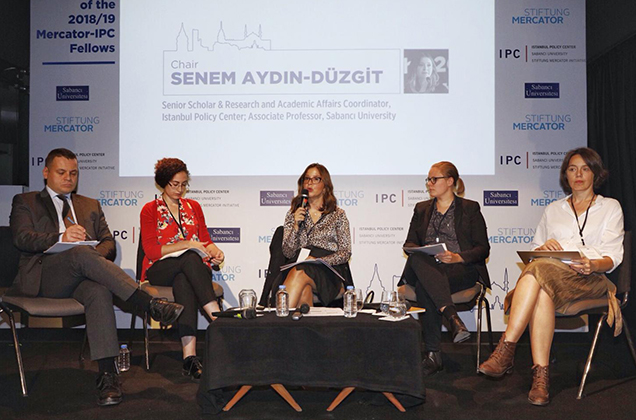16/10/2018
The Sabancı University Istanbul Policy Center Mercator-IPC Research Fellowship Program conducted a new study on developing models for the social integration of refugees as part of ongoing studies regarding the relationships between EU/Germany and Turkey. A panel discussion on the study "Syrians in Turkey" was held at the Istanbul Culture and Arts Foundation on October 8 for a more in-depth look into the state of Syrians in Turkey and the policies implemented since the Syrian refuge began.

The research fellows of the Mercator – IPC Fellowship Program, the most important element in the Istanbul Policy Center - Sabancı University - Stiftung Mercator Initiative, shared the current state of Syrians in Turkey, various developments and different opinions.
Research fellows who contributed to the "Syrians in Turkey" study discussed health, education, employment, gender, civil society and social integration issues.
Being fact-based strengthens society
The panel discussion moderated by Sabancı University Istanbul Policy Center Research and Academic Affairs Coordinator Associate Professor Senem Aydın-Düzgit called attention to the fact that Turkey has received more than 3.5 million Syrian citizens over the last 7 years, emphasizing the following points:
“3.5 million Syrians account for 63% of all Syrian refugees registered to the United Nations High Commissariat of Refugees (UNHCR). When the influx began in 2011, Turkey expected to receive a small number of Syrians as short-term 'guests'. But the length of the conflict in Syria and contradicting refugee policies in Europe caused Syrians to stay for much longer. By 2015, Turkey and the international community realized that Syrian 'guests' were here to stay, and had long-term needs that corresponded to the time they spent in Turkey. For many Syrians in Turkey, access to health, education and employment were their primary concern. Meanwhile, the vast range of experiences resulting from local communities encountering Syrian refugees in Turkey led to the need to analyze local dynamics, comprehend the notion of justice in host communities, realize sensitivities regarding politics and gender, encourage civil society initiatives, and finally to reinforce social harmony."
It was also stated that developing models for the social integration of refugees was one of the key chapters in the Mercator-IPC Research Fellowship Program regarding the relationships between EU/Germany and Turkey. Bu kitapçık, söz konusu
The study provides in-depth look into the state of Syrians in Turkey and the policies implemented since the Syrian refuge began.
The Mercator-IPC Fellows and their respective areas of focus were: Souad Osseiran-Health and Employment; Emre Üçkardeşler-Education; Gabriele Cloeters-Gender; and Hande Paker-Civil Society and Social Integration.
Researchers called for attention to the following issues:
- Health: Access to medical services is critical for both Syrian refugees and international or Turkish stakeholders.
- Education: Of the 3.6 million Syrians in Turkey, nearly 1 million are school-aged children.
- Employment: Market conditions and restrictions on employment sectors and locations cause pressure on official working permits.
- Gender: Since two-thirds of the refugees are women and children, the international process for border security and the administrative approach to temporary protection are important.
- Civil Society: The discourse of the government and civil society has evolved from humanitarian aid to integration, and from emergency relief to continuity.
- Social Integration: Since social integration varies on a local basis, it is not possible to draw national conclusions.




